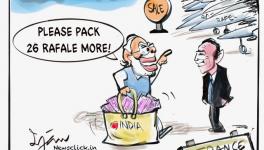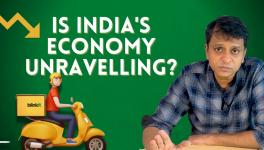Will India’s Corporates Ever Support Society?
(Rahul Bajaj)Image for representational use only.Image Courtesy : Livemint
Industrialist Rahul Bajaj made headlines by saying that industrialists fear the current BJP regime. “You are doing good work,” he said of the current regime, but comparing it with the second term of the previous UPA government, he found it lacking in a significant way: “We could criticise anyone in UPA government,” he said. “But there is no confidence that if we [industrialists] criticise you openly you will appreciate that.”
Just a day ago, the investor Mohandas Pai and Biocon chairman Kiran Mazumdar-Shaw sparred on social media over the visit of Bollywood actor Deepika Padukone to Jawaharlal Nehru University, days after its students were attacked by armed goons, including ABVP members. It was similar to what had occurred after the suicide of Café Coffee Day owner VG Siddharth. At the time, Shaw had hinted at “tax terrorism” as one of the triggers for his death. Soon after, Shaw reported that she was immediately warned by a top government official to not speak out in this way. Similarly, last July, Godrej chairman Adi Godrej warned that growing intolerance, hate crimes and moral policing can “seriously damage” economic growth. Mohandas Pai had called him and all critics of the government “Lutyens Affected”.
Contrary to Indian businessmen, American businessmen are vocal about their political beliefs. The whole world knows that Amazon’s Jeff Bezos criticises American President Donald Trump. In the paper he owns as well, the Washington Post, Trump is resoundingly criticised. Trump often hits back via social media. One time, Bezos was so miffed that he wished Trump were sent into space. Tim Cook, the CEO of Apple, has also censured the current American government, especially on the immigration ‘reform’ being pushed through by his government, against which Apple filed a friend-of-the-court brief last November.
Though Cook and Trump are quite apparently friends now, consider the situation in India. We have, basically, no more than three people who have ever spoken out against the current regime. It’s an old habit of Indian corporates. Industrialists, for example, go gaga over every budget announced by the government on-camera. Off-camera, they cry their eyes out over the measures taken. Returning to the recent episode at JNU, surprisingly, only Bollywood stars and producers, who are often accused of living in ivory towers, have supported the students of JNU, while the corporates have stayed aloof and unmoved.
Why are India’s high and mighty from the corporate field, who have access to the best lawyers, hefty resources and power, always silent? Why do they not come out and openly criticise what they think is wrong, or stand up for what they believe is right?
After Independence, when India had just begun to industrialise, many legendary businessmen had a face-off with the government of the day. In the mid-1950s, Ghanshyam Das Birla had proposed to set up a steel plant in Durgapur, West Bengal, but then prime minister Jawaharlal Nehru preferred to set up a government-owned plant instead, which sparked off many debates and disputes between Birla and the government. Birla also wrote several letters to Nehru expressing reservations about his economic views. Similarly, in 1961, JRD Tata informed Nehru that he would like to give donations to the Swatantra Party, which angered Nehru—but they were able to talk about the issue. Tata frankly confessed in a letter written on 16 August 1961 to Nehru that the industrialists were “perturbed” by the lack of an organised Opposition party and so were backing the Swatantra party.
It is also true that the Congress party was very close to corporates of the day, but that does not mean the fears raised by Rahul Bajaj or the too-few others about the current dispensation should be dismissed outright. Despite liberalisation and so-called transparency, the Indian government has not loosened controls over the day-to-day functioning of business houses. In any case, the Inspector Raj or License Raj is being dismantled only in name. So businessmen are afraid of the non-transparent system that successive governments have put in place. After all, it is none less than the Supreme Court which had called the Central Bureau of Investigation a “caged parrot”. Even the Enforcement Directorate and FERA loom large on the psyche of businessmen. In this scenario, political funding is a sure-shot tool to avoid difficult times.
Not only at the national level, but even in states there is an atmosphere of fear against the local governments. There are frequent knocks at the doors of corporate houses demanding donations on one pretext or another. To a large extent, it is businessmen themselves who are responsible for this situation. For, business organisations always live in the hope of getting some concession or rebate from governments to further their profits. And on this, every successive government delivers, a little more at times, still more at times.
The Anil Ambani-led Reliance ADA Group has been facing difficult times, but it got a breather in the form of Rafale’s offset account. There are open talks about how Reliance Industries and the Adani Group have been getting extra positive attention from the government. At the local level, any politician who comes in power benefits the merchants who funded it. As a result, businessmen find silence is golden. While the social and economic ecosystem in India collapses and the credibility of government institutions is at an all-time low; while unrest is rife and the youth do not have jobs, India’s businessmen behave like Nero.
Someone once said, that it’s a fallacy that kings rule, when it is the merchants who actually do so. So do we surmise that it is the businessmen who are really in control of the levers of power, no matter which outfit rules at the Centre? This would explain why the upheavals in our society of late do not bother them. In the name of Corporate Social Responsibility, the private enterprises have been opening up schools, hospitals and other ventures, but they hardly care about all other things that make societies strong; such as respect for the rights of citizens, freedom of dissent, and justice. They are left by corporates as a matter for the state to settle with the citizens independently, while tycoons and mini-tycoons are happy to watch from the fences.
In 1964, when Martin Luther King was conferred the Nobel Peace Prize, the mayor of Atlanta decided to host a gala dinner open to all races. The idea was not received well by the the city’s White Who’s Who. Sensing the tepid response, the mayor approached Robert Woodruff, a former Coca-Cola Company president and sought his intervention. The company immediately swung into action, and held a press conference in which it declared that if the city cannot honour its hero—King in this case—then whatever losses it may incur in the process, the company’s management will not think twice before relocating elsewhere. Finally, almost 12,000 attended the dinner. King told the audience that memories of the night will remain with him for a long time. All stood and sang ‘We Shall Overcome’ that night.
The bigger the mess India’s economy is in, the more both sentiments and its official parameters ebb, the more corporate India must speak out. Their offices can or will be raided, they can face harassment, but they should stand up and support society as they are a part of it. If sections of society are targeted today, tomorrow, it could be them. The profits they earn are supposed to create value for shareholders not earn them the sticky tag of crony capitalism, which remains glued to their back, and for good reason. India needs more Bajaj, Shaw and Godrej-style corporates who can, at least intermittently, join hands with society and sing “We Shall Overcome”.
The author is a freelance journalist who previously worked in the corporate sector. The views are personal.
Get the latest reports & analysis with people's perspective on Protests, movements & deep analytical videos, discussions of the current affairs in your Telegram app. Subscribe to NewsClick's Telegram channel & get Real-Time updates on stories, as they get published on our website.
























